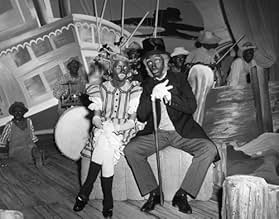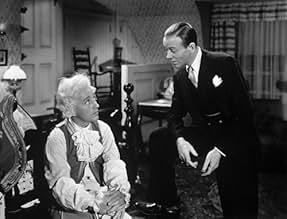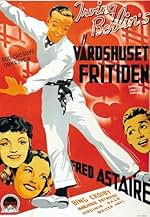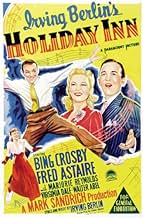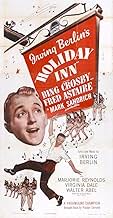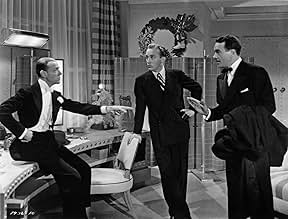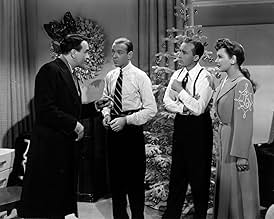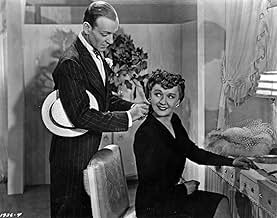CALIFICACIÓN DE IMDb
7.3/10
19 k
TU CALIFICACIÓN
En una posada que sólo abre los días festivos, un cantante y un bailarín compiten por el afecto de una bella y artista prometadora.En una posada que sólo abre los días festivos, un cantante y un bailarín compiten por el afecto de una bella y artista prometadora.En una posada que sólo abre los días festivos, un cantante y un bailarín compiten por el afecto de una bella y artista prometadora.
- Dirección
- Guionistas
- Elenco
- Ganó 1 premio Óscar
- 3 premios ganados y 2 nominaciones en total
Bob Crosby Orchestra
- Orchestra
- (as Bob Crosby's Band)
Edward Arnold Jr.
- Second Dancer Ted Bumps Into
- (sin créditos)
Loretta Barnett
- Dancer
- (sin créditos)
Muriel Barr
- Dancer
- (sin créditos)
Harry Barris
- Midnight Club Orchestra Leader
- (sin créditos)
Patsy Bedell
- Dancer
- (sin créditos)
Opiniones destacadas
The source of the song "White Christmas" would be worth watching just for that, but in addition the movie has a bunch of wonderful dancing, and quite a lot of charming songs; "I'll Capture Your Heart Singing", "Come To Holiday Inn", "You're Easy to Dance With", "Oh How I Hate to Get up in the morning", "White Christmas", and "Happy Holiday" (all by Irving Berlin) are some of the highlights.
Anyone who is a fan of Crosby or Astaire will enjoy this movie. Marjorie Reynolds and Virginia Dale play perfect foils for Crosby and Astaire, supporting them.
The plot, what there is of it, is just enough to hang enough Muscial numbers on to keep the movie running along apace.
Anyone who is a fan of Crosby or Astaire will enjoy this movie. Marjorie Reynolds and Virginia Dale play perfect foils for Crosby and Astaire, supporting them.
The plot, what there is of it, is just enough to hang enough Muscial numbers on to keep the movie running along apace.
This movie has so much and if you can make the chemistry thing the sparking between Bing and Fred and ignore the sidebar romances that don't quite grab you, then you will truly enjoy it. "White Christmas" - the first performance of the standard and it always grabs me. And I must have seen it fifty plus times. The dancing scene with Fred and the firecrackers, stupendous, incredible, how DID he do it?? Forget the blackface bits, slightly offensive, even considering the era. And the rah-rah-rah for WW2. Evocative of 1942 and FDR. Everything comes together beautifully down to the encore of "White Christmas" and Bing in the best of voice all through. Story is just about zero and no credibility - imagine an inn open fifteen days of the year with an enormous cast for the floor show (with full orchestra, no less). Bankrupt after the payroll for one holiday would be my guess :>). But lovely and nostalgic and worth watching over and over, just for the boys, Fred and Bing. 7 out of 10.
"Holiday Inn" is the story of singer/dancer entertainers (Fred Astaire, Bing Crosby, Virginia Dale) who work together in New York. As the group splits up, one seeking a more tranquil life style, a third entertainer comes on the scene as a young aspiring singer/dancer (Marjorie Reynolds). Hoping to break into the business, she meets and begins work with one of the successful members. Relationships develop and change. This film (if it is not) should be an American classic. The music is excellent with performances of "White Christmas" and "Easter Parade." Both singing and dancing is very good (and what else could you expect with Astaire and Reynolds) and singing with Crosby. It is a warm, romantic film which depicts the celebration of many holidays. We use "Holiday Inn" as a staple, showing it several times during the Christmas season. Unlike many films from this era, it can be found is BOTH VHS and DVD. The DVD version includes both "Holiday Inn" and "Going My Way," another Crosby film. This is a great "feel good" film with a fantastic cast.
This film is good in so many ways. The song and dance numbers were all great. Teaming Bing Crosby and Fred Astaire was a great idea. These two played off each other so well that I can't imagine two other actors doing so well. Even Crosby and Hope wouldn't have done as well here. Marjorie Reynolds was a treat to look at but also had good chemistry with both Crosby and Astaire. The support cast was equally as good, Walter Abel as Danny Reed, Virginia Dale as Lila Dixon and Louise Beavers as Mamie gave solid performances.
The set was also beautiful. Obviously the Hollywood set of Holiday Inn at the end of the film that was supposed to be a reproduction of the real Holiday Inn in Connecticut is the same set used for both scenes. However it is such a realistic set that the viewer never suspects that the Connecticut scenes were filmed indoors. I think the fact that the film was in black and white helps in that respect. A color film may have actually looked more phoney.
The story is a simple one but well put together. I think many viewers can relate to guys trying to steal girls from one another, its a common enough practice today. The ending is a bit fairy tale like but then that is why so many probably like it. We get enough "reality" in our every day lives. It is nice to escape reality with a film like this.
Lastly, the black face scene during the Lincoln Day performance is offensive but it does not ruin the film. Of course a minstrel show today using black face would be unacceptable in today's environment but you can't hold a 1940's film to the same standards. I know some would like to have that scene removed from the film but I disagree. I am of African American decent and while I could view this film as a disgrace I accept it for what it is. Rather than try and obliterate scenes such as this from our film history I think they should be viewed as stepping stones to where African Americans are in film today. There may still be barriers that need to be broken through in the film world but considering where African Americans started we as a society should also take time to appreciate the accomplishments that have been achieved. Black face is out. Demeaning "yesum" roles are for the most part gone and now leading roles that portray African Americans in well to do positions in society are becoming more and more frequent. So while some of the film history regarding African Americans portrays them in a negative manner it is because of those actors and actresses were able to work in those roles and under those conditions that the modern day African American actors and actresses are able be seen in a more positive light. Ignoring the past roles ignores the actors and actresses that struggled through those times.
The set was also beautiful. Obviously the Hollywood set of Holiday Inn at the end of the film that was supposed to be a reproduction of the real Holiday Inn in Connecticut is the same set used for both scenes. However it is such a realistic set that the viewer never suspects that the Connecticut scenes were filmed indoors. I think the fact that the film was in black and white helps in that respect. A color film may have actually looked more phoney.
The story is a simple one but well put together. I think many viewers can relate to guys trying to steal girls from one another, its a common enough practice today. The ending is a bit fairy tale like but then that is why so many probably like it. We get enough "reality" in our every day lives. It is nice to escape reality with a film like this.
Lastly, the black face scene during the Lincoln Day performance is offensive but it does not ruin the film. Of course a minstrel show today using black face would be unacceptable in today's environment but you can't hold a 1940's film to the same standards. I know some would like to have that scene removed from the film but I disagree. I am of African American decent and while I could view this film as a disgrace I accept it for what it is. Rather than try and obliterate scenes such as this from our film history I think they should be viewed as stepping stones to where African Americans are in film today. There may still be barriers that need to be broken through in the film world but considering where African Americans started we as a society should also take time to appreciate the accomplishments that have been achieved. Black face is out. Demeaning "yesum" roles are for the most part gone and now leading roles that portray African Americans in well to do positions in society are becoming more and more frequent. So while some of the film history regarding African Americans portrays them in a negative manner it is because of those actors and actresses were able to work in those roles and under those conditions that the modern day African American actors and actresses are able be seen in a more positive light. Ignoring the past roles ignores the actors and actresses that struggled through those times.
I am most certainly under 70 and I absolutely adore this movie! Fred and Bing are great together. The songs are some of Irving Berlin's best. With Bing's voice together with Fred's dancing...it is a first class classic! My sister & I always looked forward to watching this at the holiday season.
¿Sabías que…?
- TriviaThe Connecticut inn set for this film was reused by Paramount 12 years later as a Vermont inn for the musical Blanca navidad (1954), also starring Bing Crosby, and again with songs composed by Irving Berlin.
- ErroresThe telegram that Ted Hanover receives from Jim Hardy on Christmas Eve is dated December 25th.
- Citas
Linda Mason: My father was a lot like you, just a man with a family. Never amounted to much, didn't care. But as long as he was alive, we always had plenty to eat and clothes to keep us warm.
Jim Hardy: Were you happy?
Linda Mason: Yes.
Jim Hardy: Then your father was a very successful man.
- Créditos curiososIn the opening titles the main credits for Irving Berlin as composer and lyricist, and Mark Sandrich as producer and director, are each facsimiles of their genuine signatures.
- Versiones alternativasIn 2008, the film was restored and colorized by Legend Films.
- ConexionesFeatured in Concept (1964)
- Bandas sonorasOverture
(uncredited)
Music and Lyrics by Irving Berlin
Performed by the Paramount Pictures Studio Orchestra and Chorus conducted by Robert Emmett Dolan
Selecciones populares
Inicia sesión para calificar y agrega a la lista de videos para obtener recomendaciones personalizadas
Detalles
Taquilla
- Presupuesto
- USD 3,200,000 (estimado)
- Total a nivel mundial
- USD 80
- Tiempo de ejecución1 hora 40 minutos
- Color
- Relación de aspecto
- 1.37 : 1
Contribuir a esta página
Sugiere una edición o agrega el contenido que falta


